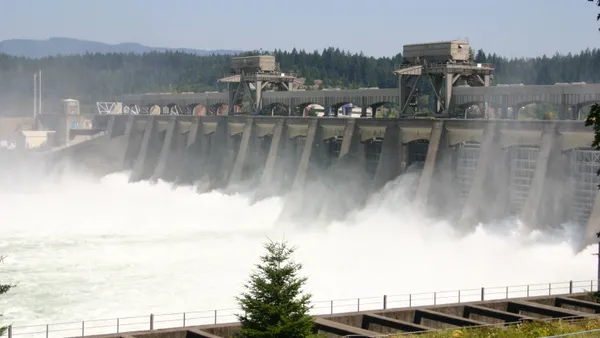Dive Brief:
- A U.S. District Court rejected Dominion Virginia Power's request to dismiss Sierra Club's lawsuit against it for alleged violations of the federal Clean Water Act (CWA) and a state permit. The suit claims that arsenic and other pollutants are migrating from coal ash stored at its shuttered Chesapeake Energy Center coal plant through groundwater into the Elizabeth River.
- The judge rejected arguments from Dominion that the suit has no merit because the Clean Water Act doesn't cover groundwater, the Sierra Club could not prove harm to its members, and the suit was a "back-door" way of challenging the utility's state permit, according to the Virginian-Pilot. The suit would require removal of the estimated 975,000 cubic yards of coal ash to a dry, lined landfill.
- The Chesapeake Energy Center was shuttered in 2014. Dominion is currently seeking approval from Virginia Department of Environmental Quality to permanently store the coal ash residue built up over 61 years at the site.
Dive Insight:
Coal ash problems have plagued utilities in the Southeast in recent years, with coal ash spills in Tennessee and North Carolina. Dominion is the latest to come under fire for its handling of coal ash.
In response to the lawsuit, Dominion argued Sierra Club’s allegations concerning the CWA were illegitimate because the federal act doesn't cover groundwater, the Sierra Club failed to prove harm to its members, and the Sierra Club was using the suit as a way to challenge the issuance of a state coal ash permit.
U.S. District Judge Raymond Jackson rejected all of Dominion's claims. He ruled that the Sierra Club is "alleging a violation of a valid permit," not that the actual permit is invalid. While federal courts remain divided over whether pollution that begins in the groundwater before flowing into navigable water is covered under the Clean Water Act, Jackson said the recent decision in the Duke Energy case in North Carolina showed it does apply.
In that case, Duke Energy faced several misdemeanor charges alleging the utility violated the Clean Water Act when tons of coal ash from a Duke power plant spilled into a river. The Clean Water Act does not historically cover groundwater, but judges have been split on whether the law covers tributary groundwater, which is at the heart of the Dominion and Duke cases.
The U.S. Environmental Protection Agency recently issued a new ruling on the handling of coal ash in December 2014, but the rule failed to satisfy utilities and environmentalists alike.
The ruling established requirements and standards for the management of coal combustion residuals under the federal Resource Conservation and Recovery Act (RCRA). Environmentalists rejected the ruling because it categorized coal ash as solid waste instead of hazardous waste. Utilities dislike it because it is "self-implementing," potentially leaving them open to lawsuits like this one.
The EPA has been working on another coal ash rule that's expected to set the first federal limits on toxic metals from ash in wastewater discharges from power plants.













